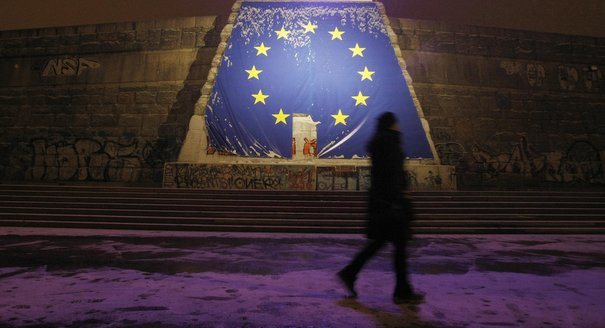Power is defined not only by power resources, but also by acts. For the EU in its capacity as a foreign policy power, there have been several defining moments in recent years. In each of them, Europe’s leaders have shown a lack of political will to equip the EU with the necessary resources for it to become a serious foreign policy player. With the upcoming Eastern Partnership summit in Vilnius, the EU is now approaching another of these crucial moments.
One moment of truth came in 2011 when Germany decided to abstain from UN Security Council Resolution 1973 authorizing a no-fly zone over Libya. The message was reinforced by Berlin’s decision to pull out of NATO patrols in the Mediterranean, after the alliance had announced it would intercept vessels suspected of bringing illegal arms or mercenaries into Libya. By abstaining, Germany aligned itself with Brazil, Russia, India, and China, instead of its close allies the United States, France, and Britain.
The lesson others were taking was clear: when it comes to interventions abroad, don’t count on Germany. Berlin was apparently using its new weight to forge a more independent position, following its pacifist instincts. This was a massive setback for those who hoped that Europe’s key military powers would converge in their attitudes and move toward greater coordination and cooperation.
Another key moment was when U.S. Secretary of State John Kerry and Russian Foreign Minister Sergei Lavrov announced in early May 2013 that they had agreed to hold a peace conference on Syria. This announcement confirmed what had been on display since the Syrian crisis began: that despite having an enormous interest in ending the civil war, the EU was incapable of rising above internal differences and acting in concert, diplomatically and perhaps also with other means. Diplomatic efforts on Syria are being led by Washington and Moscow; Brussels is leading only on the humanitarian front.
The EU’s failure to address the Syrian civil war is only the most visible expression of a more general failure to use the ongoing Arab transformation as an opportunity to develop a new partnership with Europe’s Southern neighbors.
A third defining moment was when German Chancellor Angela Merkel, at the end of May 2013, stood next to Chinese Prime Minister Li Keqiang in Berlin and made it clear that she was backing Beijing against the European Commission in a trade dispute over solar panels. The message was that Germany valued bilateral economic relations with China more than European unity on a key strategic question, pressing Beijing to play by the rules.
Berlin had apparently given in to behind-the-scenes pressure from China. Germany’s stance had undermined the European Commission in an area where the EU has a huge amount of leverage: global trade. Germany had invited China to continue to play divide-and-rule.
Now, the EU is moving toward another crucial moment, another test of political will: a new step in its relations with its Eastern neighbors and, by implication, with Russia.
At the Eastern Partnership summit in Vilnius at the end of November, Ukraine hopes to sign an association agreement with the EU. Moscow strongly opposes the accord. It wants Ukraine to become part of the Russia-led Eurasian Union, whose strategic goal is to counter EU influence in what it sees as its “near abroad”: a zone of limited sovereignty where Russia as a great power has the right to dominate.
For years, Europeans have tried to stay out of geopolitical competition with Russia, attempting to convince Moscow that associations of post-Soviet countries with the EU are “win-win solutions” that foster a modernization and stabilization that would also benefit Russia.
But now, some kind of showdown looks inescapable. Participation in the Eurasian Union is incompatible with associate status with the EU; the members of the EU’s Eastern Partnership have to make a choice. Armenia, dependent on Russian protection because of its unresolved conflict with Azerbaijan in Nagorno-Karabakh, has already bowed to pressure from Moscow and decided not to sign an association agreement with the EU.
The way the EU asserts its interests and principles in the East in the coming weeks will define its future role in the region. The EU has two main interests in its East. One is long-term stability, which is most likely if the Eastern neighbors move toward the kind of liberal democracy the EU stands for and promotes through the Eastern Partnership.
The other interest is to make Russia understand that it has to accept the full sovereignty of those countries that once took their orders from Moscow. This is first and foremost a matter of principle, as the UN order is based on the sovereignty of states.
But it is also a matter of interest, as Russian interference in its neighborhood often increases tensions. Accepting its external borders as defining the limits of Moscow’s direct influence will help Russia to get past its imperialist history and morph into a modern nation-state that can focus on the overdue rebuilding of its own governance structures.
November’s Vilnius summit is a chance for the EU to prove it can be a serious global player by asserting its values and interests in its Eastern neighborhood. Europe’s leaders must seize that opportunity and avoid yet another moment of disappointment.








